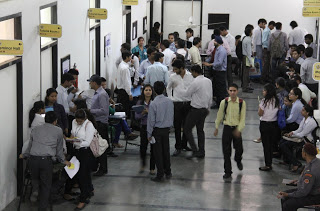
How to get the most out of career fairs
Helen Stringer is careers services manager at the University of Warwick
A careers fair is a great opportunity for you to meet (and compare) employers, find out when they′re recruiting and - crucially - what they′re looking for. Yes, the freebies might be good but there′s more than a novelty pen and branded chocolate at stake! Make a strong impression on the day and you could find yourself invited for an interview or, at least, strongly encouraged to apply. To do this, follow some basic career fair etiquette:
Do your research
Read the fair guide – find out which companies are coming and make a shortlist of those you would most like to visit.
Familiarise yourself with company websites. This will help you later on when you come to meet the employer; don′t waste time asking things that a basic search online will answer.
Ask the ′right′ questions
If you are well informed and well prepared, this will pay dividends when you talk to the employer. Skipping over the superficial stuff means you can delve deeper and potentially find out information they haven′t included in the glossy literature. The information you glean now can really make the difference between a mediocre application and a stand out one.
Questions you could consider:
What was your first year like? Did it meet your expectations?
What experience do you like applicants to have
Was there anything specific that encouraged you to apply?
What words would you use to describe the company culture?
What are the key changes or trends within the industry/profession?
On the other hand, questions to avoid:
What does your company do?
How much would I earn?
Why should I apply?
What can you offer me?
On the day
This is a chance to market yourself to potential employers, so think about what you′re going to say and how you′re going to say it. If you decide to take a CV (generally a good idea) make sure it looks professional and includes all the relevant information. Other things to consider:
Be polite and friendly, but remember you are still talking to a recruiter. Keep it professional
Find your own USP. Many students will have a broadly similar profile, so try to highlight your particular skills and qualities.
There′s no need to wear business dress, but you still need to look presentable. Bear in mind the recruiter will be considering you as a future employee. What image are you looking to project?
Bring copies of your CV and/or business cards with your contact details. Many employers now recruit online, but it′s good to have a copy of your CV, just in case…
A notebook might be handy. There′s a lot of information to process, and you don′t want to miss the key points.
Try not to monopolise any of the employers – keen is good, overbearing isn′t!
A few things to remember
If you′re not sure where you want to work, a careers fair can introduce you to a range of possibilities. Just don′t engage employers in conversation unless you have - at least - some idea of what they do. Keep a copy of the fair guide with you for reference and chat to someone on the careers stand if you need a bit more guidance.
If you′re a nervous networker, see this as an opportunity to practise your skills. Try and step outside your comfort zone by setting a personal target: identify two or three employers you want to speak to and prepare some questions beforehand.
After the fair, make time to synthesise all the information you′ve gathered. Think about how you will use this to focus your job search or enhance your applications.
Jan Steele is a careers practitioner at the University of Southampton
Don′t ask about job opportunities as your very first question – try to get them interested. Ask relevant, not obvious questions. Examples include:
Is there one thing that marks out a good application, if so, what would you say it is?
Which of the company′s practice areas are the main drivers of the business?
How would you describe the work culture of your company?
Employers get hundreds of applications but if you create a favourable, professional impression, they will remember you and look out for your application.
Aim to get the contact details of people you have met. They can form part of your network not just for the immediate, but also for the long-term future.
If you think of a question later, contact the person you met to find out if they can help. Consider sending your targeted CV and cover letter to them. Remind them in the cover letter that you met them at your university′s fair – this can be a good reminder of who you are.
Please confirm If you want to unregister
You have been unregistered from gradlink







